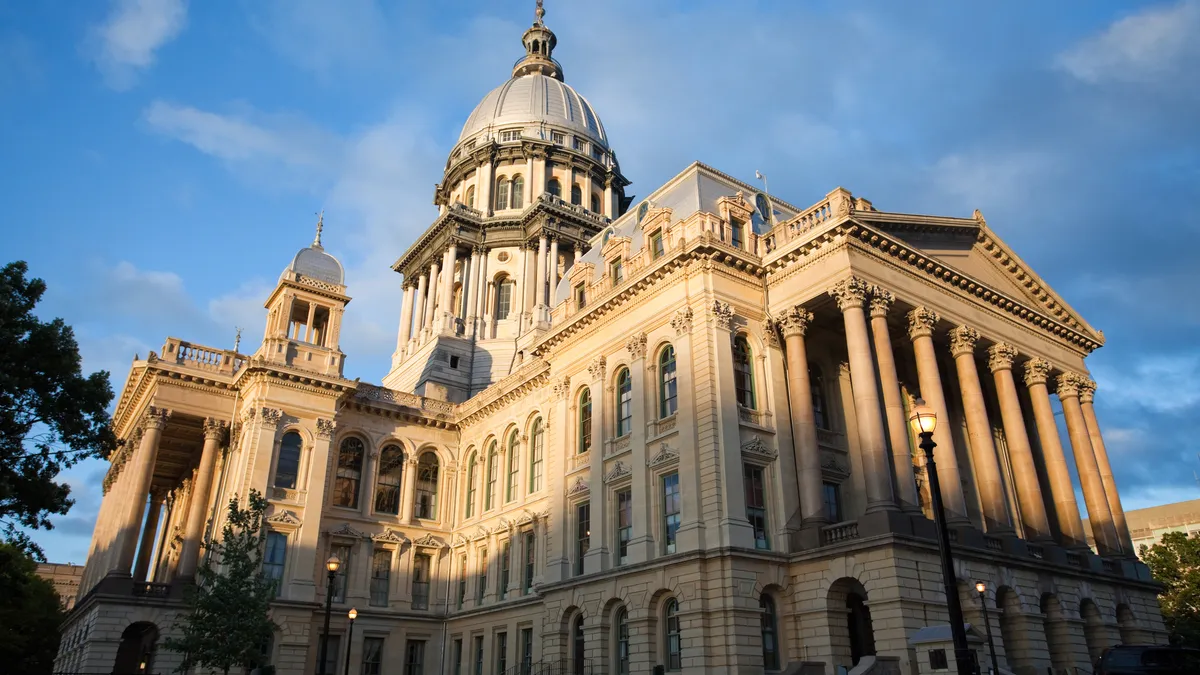Dive Brief:
- Illinois lawmakers passed legislation that provides alternative licensure paths to become a certified public accountant, with the state Senate on Thursday unanimously passing House Bill 2459 by a vote of 58-0, according to the Illinois General Assembly's website. The bill still needs to be signed by Illinois Gov. JB Pritzker.
- Similar to many other states aiming to draw more people into the profession, the Illinois bill offers a new licensure route that doesn’t include a requirement for 150 hours of college credit. Under the rules in the legislation, a CPA candidate could get licensed by completing a bachelor’s degree with an emphasis on accounting and two years of experience, along with passing the CPA exam.
- The bill, which amends the Illinois Public Accounting Act, is set to go into effect Jan. 1, 2027, a full year later than similar legislation in Ohio and six months after Iowa’s pathway bill’s start date. The later date allows time to establish new administrative rules needed to implement the changes, according to Martin Green, senior vice president and legislative counsel for the Illinois CPA Society, which supports the changes. “We wanted to do it right,” he said in an interview.
Dive Insight:
Since late last year, at least 17 states and counting have passed legislation to change their CPA licensure rules. That growing list includes Ohio, Virginia, Indiana, Minnesota, Iowa, Montana, Tennessee, Georgia, South Carolina, Texas, New Mexico, Utah, Nevada, Oregon, Alaska, Hawaii and now Illinois.
The intent behind the legislative changes is an aim to remove or provide an alternative to the previously standard path to licensure that requires 150 hours of college credit, one year of professional experience, and passing the CPA exam. Proponents of the new laws in the accounting industry hope to ease an accounting talent shortage by removing the 150 hour requirement, which they say is a costly barrier that typically equates to a total of five years in college or graduate school.
Some states, like Illinois, are leaving the existing set of requirements in place but providing two other options, including getting a master’s degree with a concentration in accounting, completing one year of relevant work experience and passing the exam, as well as the bachelor’s degree route. There are some signs that the effort could be putting pressure on states that want their accounting profession to remain competitive.
“As states in the Midwest and across the nation move forward with their own legislation to protect and grow their CPA ranks, passage of this legislation is an important step in keeping Illinois’ CPAs at the forefront of the national business landscape; protecting the needs of our state’s businesses, nonprofits, and units of government; and ensuring there’s a pipeline of next-generation accounting talent ready to step up to serve,” ICPAS President and CEO Geoffrey Brown said in a statement included in a release.
Still, Green cautioned that students and schools in Illinois should not yet shift the course of their studies or curriculum, respectively, as the legislation is not retroactive and it could take additional time beyond the effective date for the rules to be formally put in place.
“Students and professors have called and they [ask if they] can start this now and we say, ‘No, there are no rules in place,’” Green said. “If you’re an accounting student, it’s not ripe for you to be looking at this.”















